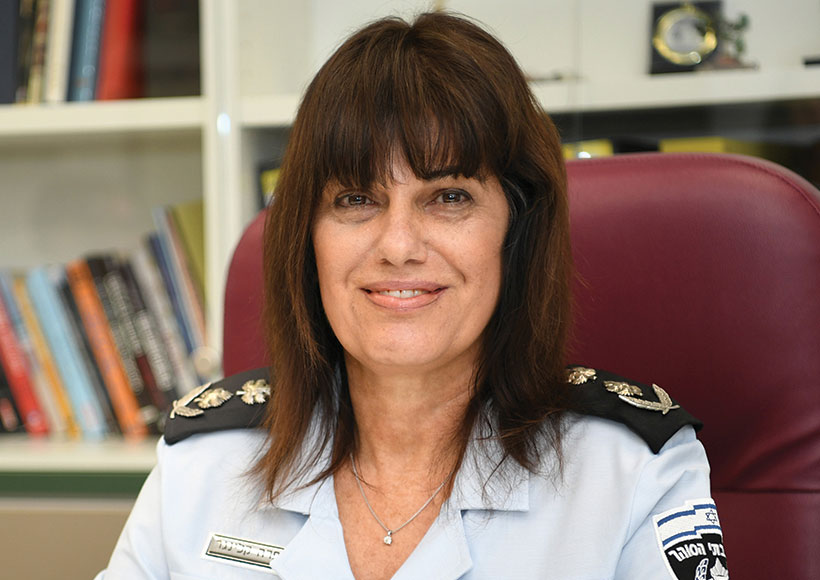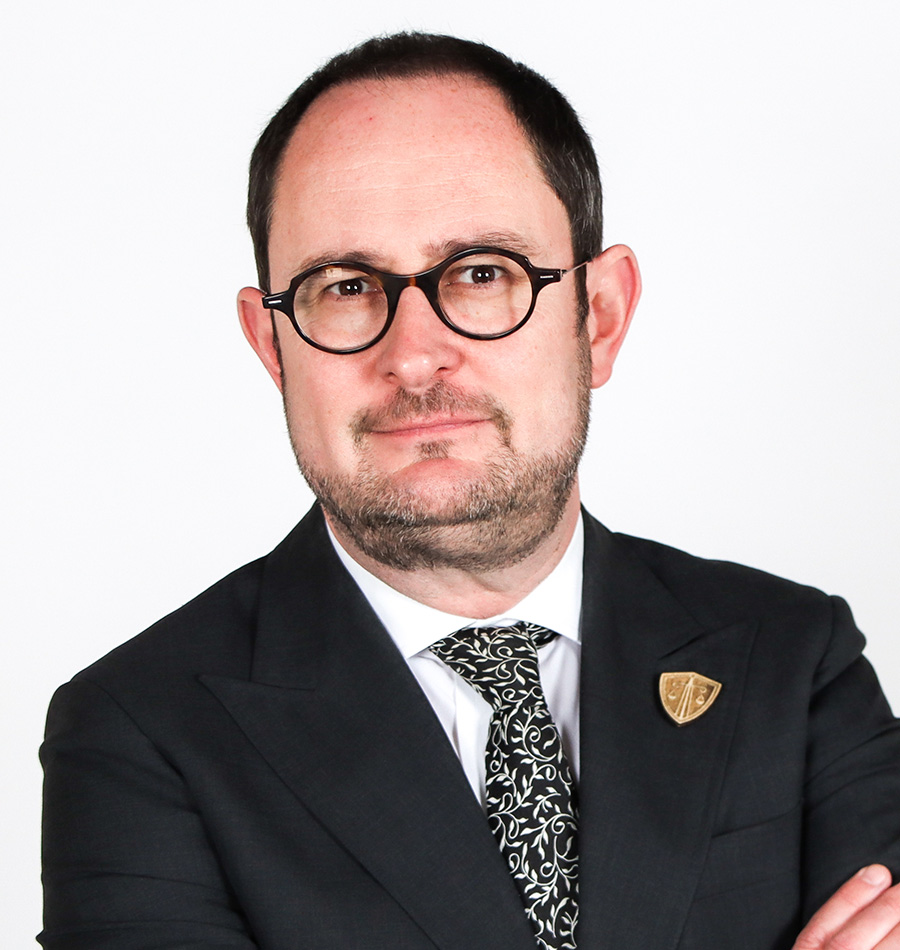// Interview: Ofra Klinger
Lieutenant General, Commissioner of the Israel Prison Service
JT: By the time you were sworn in as head of the service, the press reported that you had a mission of restoring credibility within the prison system: “(…) a security agency that has suffered a series of controversies in recent years”.
Such controversies included a life-sentenced prisoner’s escape, the smuggling of a firearm into a prison and assaults on prison staff perpetrated by inmates (Source: The Jerusalem Post 23/11/2015, “Ofra Klinger sworn in as new head of the Israel Prison Service”).
What have you done during these two and a half years of leadership to overcome those problems that had tarnished the image of the prison service?
OK: In my view, the Israel Prison Service’s (IPS) primary obligation is to hold inmates in safe custody and satisfactory living conditions. Inmate escapes are relatively rare in Israel and no escapes have occurred during the last few years, and certainly not during my term of office.
Nevertheless, the security challenges are significant and we deal with them on a daily basis. The IPS has a professional intelligence network that uses unique methods developed over the years and works in constant cooperation with other security and intelligence services.
As an organisation seeking to make continuous progress, the IPS is constantly learning and receiving updates on events throughout the world regarding the various means of smuggling contraband into prison, such as the threat of drones.
One of the most important resources for handling such incidents is the human resource: we provide ongoing training for staff, constant drilling and practicing during the daily routine (proactive searching programme, practicing a whole range of emergency scenarios, etc.), and special units highly trained to provide an immediate response to incidents of escape, smuggling contraband, disturbances, etc. In addition, the IPS has an inmate escort unit for transporting inmates to and from the courts.
I advocate a comprehensive multidimensional approach to security issues — and that security does not stand alone. Prisons are, to a large extent, the result of society’s failures and provide a solution to problems that were not previously dealt with, including the problems of the inmates themselves, which create security challenges.
Prison security is improved through maintaining a well-organised and supervised daily routine, in which the facilities have good physical conditions; the staff are satisfied, alert and attentive to the inmates; and the majority of inmates learn and participate in rehabilitation programmes or are employed.
Educational and treatment programmes create a daily routine and motivate the inmates to perform positive acts — they have everything to lose if they behave badly. Of course, this does not completely prevent security challenges and eyes must be kept open at all times.
The Israel Prison service has a professional intelligence network that uses unique methods and works in constant cooperation with other security and intelligence services.
JT: The IPS is also responsible for the offenders who are serving community service and house arrest.
To what extent are these alternatives to imprisonment used in Israel and how does the prison service intervention work in those cases?
OK: Currently, there are 2,300 people serving community service sentences and 500 people supervised by electronic monitoring. The reform shall widen the alternatives to imprisonment. Presently, the alternatives to imprisonment applied by the IPS include community service for offenders (an alternative, which is determined by the court, for offenders who have been sentenced up to six months.
In the near future, the use of community service sentences shall be expanded for offenders sentenced up to nine months); Electronic Monitoring of remand inmates; and supervision of sex offenders after their release from prison.
My opinion is that, in cases where a sentence to imprisonment is required, the offender shall serve the sentence in prison; in any other case the sentence should be served in the community. This approach has been validated by the Supreme Court and different committees handling the topic of alternatives to imprisonment.

JT: In its annual report last year, the Israeli Public Defender’s Office noted that the conditions provided by the prison service do not always meet international standards, especially when it comes to the living space allocated to each prisoner, health care provisions, the lack of social workers and scarce rehabilitation programmes for non-Hebrew speakers (Source: Jerusalem Post 09/07/2017, “Public Defender: Israeli Prison Conditions Still Insufficient”).
What is being done to meet the recommendations of the Public Defense Department issued on that report?
OK: The IPS is the most extensively audited entity in Israel. Being a professional organisation, the IPS takes the auditing and the resulting reports seriously and makes corrections, if possible, in accordance with the audit’s findings. The average amount of space for an inmate in Israel is 3.16 square meters. The majority of prison facilities are old buildings and some of them date back to the establishment of the State of Israel (1948).
I am privileged to serve as Commissioner at a significant period for the IPS. Following a High Court of Justice ruling that has been hailed as revolutionary, the IPS has received a budget for the construction of new prisons and the renovation of existing facilities, so that the living space of each inmate shall be at least 4.5 square meters. This size of living space will improve the situation of IPS prison facilities relative to other countries in the world.
However, it is important to emphasise that, when we are dealing with the issue of living space for inmates, we are not only looking at the actual size of the space but at how it serves rehabilitation goals. During my previous post, I was privileged to implement a revolutionary approach regarding treatment and rehabilitation in IPS facilities thanks to a change in legislation, and we developed advanced and ground-breaking tools in this area.
In the medical care area, we are witnessing a change in the trend of inmates’ profiles. Currently, there is an increasing number of older inmates (as older people also make up an increasing share of the general population): this population is basically less healthy and, in many cases, suffers from multi-morbidity.
A number of medical care centres have been established during the last few years, including the IPS Central Medical Centre and District Specialist Clinics, which has reduced the transportation of inmates to outside medical centres and improves the quality of treatment. Special cell blocks for tuberculosis sufferers have been established within IPS prison facilities. In addition, preventive healthcare services are provided — such as dental treatment, etc.
Regarding the shortage of social workers: in general, the IPS has no lack of social workers and our recruitment centre receives numerous requests to join the organisation. The biggest issue that concerns us the most is foreign-language speakers and the inexperience of new recruits. We invest great efforts in these areas, especially in the sphere of training.
As far as the rehabilitation of inmates who do not speak Hebrew is concerned, we believe that the successful social reintegration of the inmates relies on obtaining an education with an emphasis on language acquisition. An inmate who does not speak Hebrew or does not know how to read and write Hebrew receives, first and foremost, a programme for acquiring these tools. From here on, the inmate can continue with more programmes.
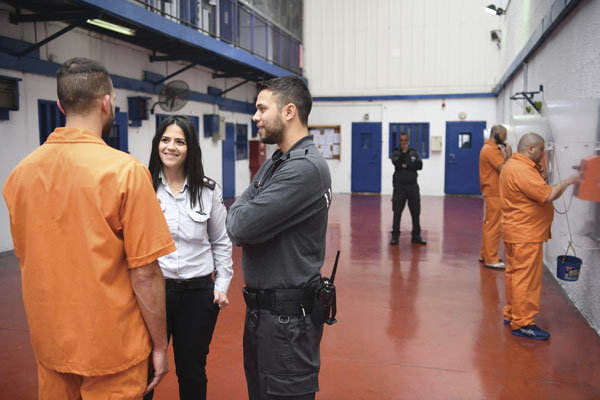
Israeli prison
JT: You have a special unit (called Tzur) in charge of monitoring sexual offenders after release from prison. What does this unit consist of and how does it work?
OK: The Tzur is the world’s most unique operational unit and its task is to monitor sex offenders in the community.
The unit was established in 2006, after a law protecting the public from sex offenders came into effect. This unit aims to prevent, as far as possible, reoffending, with its teams carrying out daily undercover activities in order to observe, monitor and ensure that ex-convicts do not commit further sex offenses.
Each team member disguises themselves in order to blend in with the surroundings, monitor people under supervision and prevent exposure to the offender. The unit was built with the unique concept that the IPS was to operate and work outside prison walls. However, unlike the police, the role of the monitoring team is not to “catch the criminal red-handed” and bring them to trial (although in some cases this also happens), but to prevent them from committing the offense again.
This is possible due to the fact that the monitored offender and the prison officers have a previous acquaintance, and thanks to the understanding that they operate for the benefit of the supervised offender whilst using methods of control and prevention. In Israel, there are 1,150 sex offenders who are monitored by this special unit, which has been proving to be greatly successful in preventing sex offense recidivism.
Following a revolutionary High Court of Justice ruling, the IPS has received a budget for the construction of new prisons and the renovation of existing ones.
JT: We are aware that the Israel Prison Service is organising an international conference on the topic of terrorism and radicalisation. How and why does this conference come about, and what will it consist of?
OK: We are talking about an International Conference of Prison Commissioners and Senior Staff that will be held in September 2018. The Conference is organised in cooperation with the International Institute for Counter-Terrorism (ICT) at the Interdisciplinary Center (IDC), Herzliya.
In recent years, global Jihad has spread and taken roots in many countries around the world, and it leads to new challenges we all have to deal with, such as terror acts committed by citizens. The return of the terrorist foreign fighters from Iraq and Syria and the radicalisation within the prisons are a new challenge we all have to confront.
The IPS holds 6,000 security inmates from different organisations (Hamas, ISIS and others). The conference presents an opportunity to deepen the knowledge in the field, to network and to share best practices. At the conference, new research on lone-wolf terrorism will be presented by the ICT, security prisons will be visited and lectures will be given by experts in the field.
The nature, structure and threat of terrorism are consistently changing and an increasing number of countries today are impacted by this threat. As such, the number of inmates that were convicted of terrorism is on the rise throughout the globe. Some very important challenges and dilemmas are arising from this situation all around the world.
Hence, the conference aims to discuss the following questions: Should inmates convicted of terror-related charges be separated from the general prison population? What are the best practices for collecting intelligence within prisons? What are the best possible means and methods to avoid the spread of radicalisation and for de-radicalisation within prisons?
How to accompany radical prisoners after their release, upon their return to their home environment (which was perhaps a radicalised one)? How to balance a culture, language and religion that you are not necessarily an expert in? How to ensure that no prohibited material is being given to inmates that were convicted of terrorism?
How to manage differently those terror organisations within prisons that are hostile towards each other? How can prison management utilise the connection with the leadership of the inmates to promote de-radicalisation? How can you use the privileges-and-sanctions system routinely, and during a period of escalation?
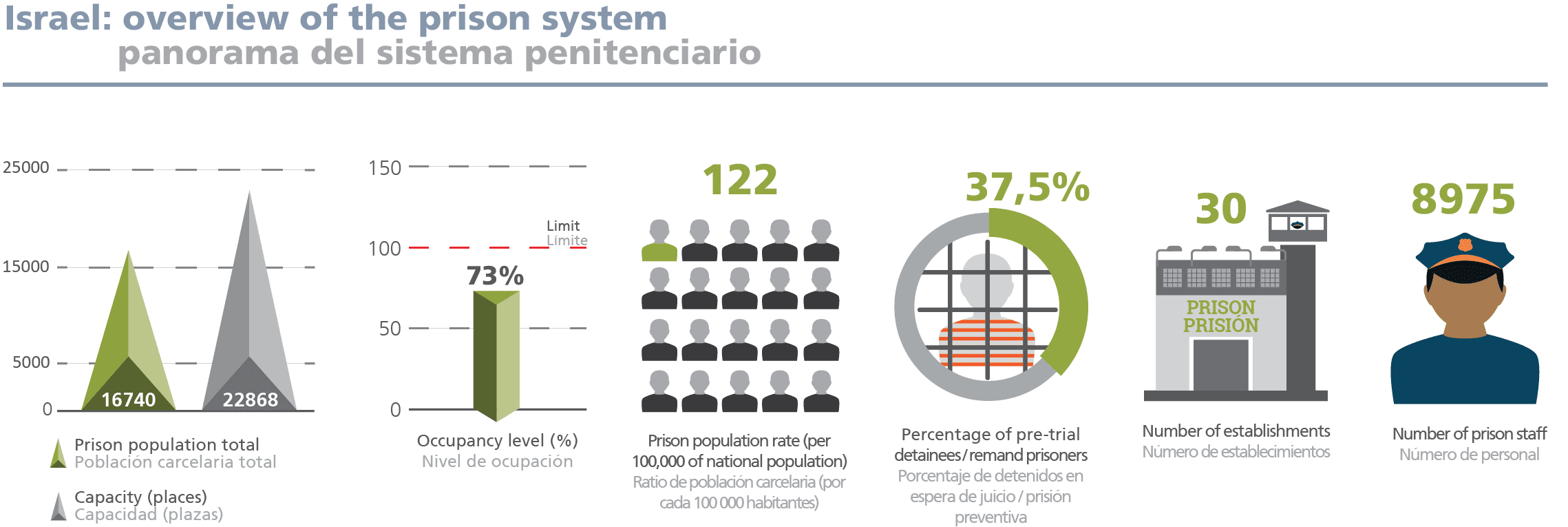
How to handle demonstrations and hunger strikes? How to manage the incarceration of terrorist inmates in a complex political and public setting? How does the Israel Prison Service manage inter-organisation intelligence with other security agencies—the IDF, Israel Security Agency (ISA), Israel Secret Intelligence Service ( MOSSAD), the Ministry of Foreign Affairs, etc.?
The conference will address these questions through keynote addresses, experts’ panel discussions and a first-hand experience visiting a security prison.
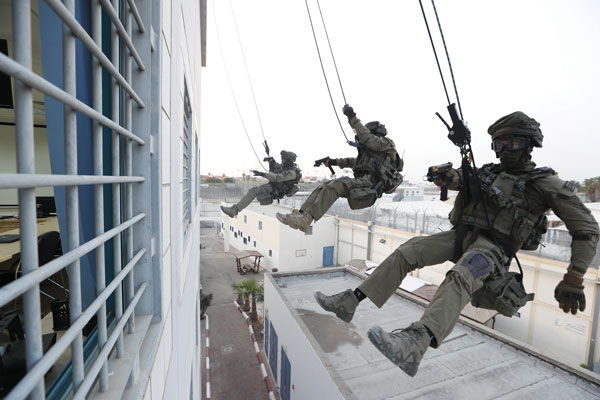
Special unit of the Israel Prison Service
JT: You are a member of the ICPA board. To what extent does this role contribute to your job as the Commissioner of the Israel Prison Service?
OK: I introduce the ICPA to the innovations and initiatives of the Israel Prison Service in Israel. Our coping skills and strategy are unique and ICPA members can learn from our experiences in the management of security prisoners.
My ongoing conversation with ICPA members and professional associations also presents the IPS with the opportunity to be updated on the latest innovations in the world of corrections in areas of imprisonment, rehabilitation of inmates, staff development and more.
I am honoured to say that the IPS has won several ICPA awards, thanks to creative thinking and a desire for innovation and originality that characterise the IPS and Israel in general.
//
Lieutenant General Ofra Klinger is a graduate of the Faculty of Law at the Tel Aviv University (LLB). She holds a Master in Political Science from the Haifa University and is a graduate of Israel National Defense College. Prior to joining Israel’s Prison Service, Lt. Gen. Klinger worked as a Prosecutor of the State Attorney’s Office (Central District). Before having been appointed as Commissioner in November 2015, she served at various positions at the Israel Prison Service, including Head of the Inmates’ Administration Section, Head of Staff, Deputy Chief Legal Advisor, and Member of the Committee Examining the Punishment and Treatment Policy for Offenders. She is an Executive Board Member of ICPA.

